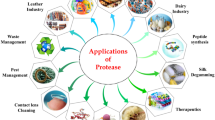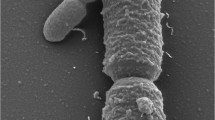Abstract
As both research on and application of proteins are rarely focused on the resistance towards nonspecific proteases, this property remained widely unnoticed, in particular in terms of protein purification and related fields. In the present study, diverse aspects of protease-mediated protein purification (PMPP) were explored on the basis of the complementary proteases trypsin and proteinase K as well as the model proteins green fluorescent protein (GFP) from Aequorea victoria, lipase A from Candida antarctica (CAL-A), a transaminase from Aspergillus fumigatus (AspFum), quorum quenching lactonase AiiA from Bacillus sp., and an alanine dehydrogenase from Thermus thermophilus (AlaDH). While GFP and AiiA were already known to be protease resistant, the thermostable enzymes CAL-A, AspFum, and AlaDH were selected due to the documented correlation between thermostability and protease resistance. As proof of principle for PMPP, recombinant GFP remained unaffected whereas most Escherichia coli (E. coli) host proteins were degraded by trypsin. PMPP was highly advantageous compared to the widely used heat-mediated purification of commercial CAL-A. The resistance of AspFum towards trypsin was improved by rational protein design introducing point mutation R20Q. Trypsin also served as economical and efficient substitute for site-specific endopeptidases for the removal of a His-tag fused to AiiA. Moreover, proteolysis of host enzymes with interfering properties led to a strongly improved sensitivity and accuracy of the NADH assay in E. coli cell lysate for AlaDH activity measurements. Thus, PMPP is an attractive alternative to common protein purification methods and facilitates also enzyme characterization in cell lysate.






Similar content being viewed by others
References
Ahmad S, Kumar V, Ramanand KB, Rao NM (2012) Probing protein stability and proteolytic resistance by loop scanning: a comprehensive mutational analysis. Protein Sci 21(3):433–446. doi:10.1002/pro.2029
Andersen KR, Leksa NC, Schwartz TU (2013) Optimized E. coli expression strain LOBSTR eliminates common contaminants from His-tag purification. Proteins 81(11):1857–1861. doi:10.1002/prot.24364
Banki MR, Wood DW (2005) Inteins and affinity resin substitutes for protein purification and scale up. Microb Cell Fact 4:32. doi:10.1186/1475-2859-4-32
Baumann M, Stürmer R, Bornscheuer UT (2001) A high-throughput-screening method for the identification of active and enantioselective hydrolases. Angew Chem Int Edit 40(22):4201–4204. doi:10.1002/1521-3773(20011119)40:22<4201::aid-anie4201>3.0.co;2-v
Betzel C, Gourinath S, Kumar P, Kaur P, Perbandt M, Eschenburg S, Singh TP (2001) Structure of a serine protease proteinase K from Tritirachium album limber at 0.98 Å resolution. Biochemistry 40(10):3080–3088. doi:10.1021/bi002538n
Bhabhra R, Askew DS (2005) Thermotolerance and virulence of Aspergillus fumigatus: role of the fungal nucleolus. Med Mycol 43(s1):87–93. doi:10.1080/13693780400029486
Cao Y, He S, Zhou Z, Zhang M, Mao W, Zhang H, Yao B (2012) Orally administered thermostable N-acyl homoserine lactonase from Bacillus sp. strain AI96 attenuates Aeromonas hydrophila infection in zebrafish. Appl Environ Microb 78(6):1899–1908. doi:10.1128/aem.06139-11
Chung CT, Niemela SL, Miller RH (1989) One-step preparation of competent Escherichia coli: transformation and storage of bacterial cells in the same solution. PNAS 86(7):2172–2175. doi:10.1073/pnas.86.7.2172
Daniel RM, Cowan DA, Morgan HW, Curran MP (1982) A correlation between protein thermostability and resistance to proteolysis. Biochem J 207(3):641–644
Dimitrijevic A, Velickovic D, Bihelovic F, Bezbradica D, Jankov R, Milosavic N (2012) One-step, inexpensive high yield strategy for Candida antarctica lipase A isolation using hydroxyapatite. Bioresour Technol 107:358–362. doi:10.1016/j.biortech.2011.11.077
Elleuche S, Schröder C, Sahm K, Antranikian G (2014) Extremozymes—biocatalysts with unique properties from extremophilic microorganisms. Curr Opin Biotechnol 29:116–123. doi:10.1016/j.copbio.2014.04.003
Eon-Duval A, Broly H, Gleixner R (2012) Quality attributes of recombinant therapeutic proteins: an assessment of impact on safety and efficacy as part of a quality by design development approach. Biotechnol Prog 28(3):608–622. doi:10.1002/btpr.1548
Ericsson DJ, Kasrayan A, Johansson P, Bergfors T, Sandstrom AG, Backvall JE, Mowbray SL (2008) X-ray structure of Candida antarctica lipase A shows a novel lid structure and a likely mode of interfacial activation. J Mol Biol 376(1):109–119. doi:10.1016/j.jmb.2007.10.079
Esposito D, Chatterjee DK (2006) Enhancement of soluble protein expression through the use of fusion tags. Curr Opin Biotechnol 17(4):353–358. doi:10.1016/j.copbio.2006.06.003
Fong S, Machajewski TD, Mak CC, Wong C (2000) Directed evolution of D-2-keto-3-deoxy-6-phosphogluconate aldolase to new variants for the efficient synthesis of D- and L-sugars. Chem Biol 7(11):873–883. doi:10.1016/S1074-5521(00)00035-1
Fontana A, de Laureto PP, Spolaore B, Frare E, Picotti P, Zambonin M (2004) Probing protein structure by limited proteolysis. Acta Biochim Pol 51(2):299–321
Gagnon P (2012) Technology trends in antibody purification. J Chromatogr A 1221:57–70. doi:10.1016/j.chroma.2011.10.034
Haki GD, Rakshit SK (2003) Developments in industrially important thermostable enzymes: a review. Bioresour Technol 89(1):17–34. doi:10.1016/S0960-8524(03)00033-6
Harmsen MM, van Solt CB, van Zijderveld-van Bemmel AM, Niewold TA, van Zijderveld FG (2006) Selection and optimization of proteolytically stable llama single-domain antibody fragments for oral immunotherapy. Appl Microbiol Biotechnol 72(3):544–551. doi:10.1007/s00253-005-0300-7
Høegh I, Patkar S, Halkier T, Hansen MT (1995) Two lipases from Candida antarctica: cloning and expression in Aspergillus oryzae. Can J Bot 73(S1):869–875. doi:10.1139/b95-333
Höhne M, Schätzle S, Jochens H, Robins K, Bornscheuer UT (2010) Rational assignment of key motifs for function guides in silico enzyme identification. Nat Chem Biol 6(11):807–813. doi:10.1038/nchembio.447
Hubbard SJ (1998) The structural aspects of limited proteolysis of native proteins. Biochim Biophys Acta 1382(2):191–206. doi:10.1016/S0167-4838(97)00175-1
Hubbard SJ, Beynon RJ, Thornton JM (1998) Assessment of conformational parameters as predictors of limited proteolytic sites in native protein structures. Protein Eng 11(5):349–359. doi:10.1093/protein/11.5.349
Hubbard SJ, Eisenmenger F, Thornton JM (1994) Modeling studies of the change in conformation required for cleavage of limited proteolytic sites. Protein Sci 3(5):757–768. doi:10.1002/pro.5560030505
Hussack G, Hirama T, Ding W, Mackenzie R, Tanha J (2011) Engineered single-domain antibodies with high protease resistance and thermal stability. PLoS One 6(11):e28218. doi:10.1371/journal.pone.0028218
Imai K, Okada Y (2008) Purification of matrix metalloproteinases by column chromatography. Nat Protoc 3(7):1111–1124. doi:10.1038/nprot.2008.74
Janson JC (2011) Protein purification: principles, high resolution methods, and applications. Wiley, New York
Kasper JR, Andrews EC, Park C (2014) Product inhibition in native-state proteolysis. PLoS One 9(10):e111416. doi:10.1371/journal.pone.0111416
Keil B (1992) Specificity of proteolysis. Springer Verlag, Berlin Heidelberg
Lee JK, Kim YO, Sunitha K, Oh TK (1998) Expression of thermostable alkaline protease gene from Thermoactinomyces sp. E79 in E. coli and heat activation of the gene product. Biotechnol Lett 20(9):837–840. doi:10.1023/a:1005355324065
Li Y (2011) Self-cleaving fusion tags for recombinant protein production. Biotechnol Lett 33(5):869--881. doi:10.1007/s10529-011-0533-8
Liu H, Naismith J (2008) An efficient one-step site-directed deletion, insertion, single and multiple-site plasmid mutagenesis protocol. BMC Biotechnol 8(1):91. doi:10.1186/1472-6750-8-91
Liu X, Garriga P, Khorana HG (1996) Structure and function in rhodopsin: correct folding and misfolding in two point mutants in the intradiscal domain of rhodopsin identified in retinitis pigmentosa. PNAS 93(10):4554–4559
Müller J, Sowa M, Fredrich B, Brundiek H, Bornscheuer U (2015) Enhancing the acyltransferase activity of Candida antarctica lipase A by rational design. ChemBioChem. doi:10.1002/cbic.201500187
Palm GJ, Zdanov A, Gaitanaris GA, Stauber R, Pavlakis GN, Wlodawer A (1997) The structural basis for spectral variations in green fluorescent protein. Nat Struct Biol 4(5):361–365. doi:10.1038/nsb0597-361
Pan Y, Cheng K, Mao J, Liu F, Liu J, Ye M, Zou H (2014) Quantitative proteomics reveals the kinetics of trypsin-catalyzed protein digestion. Anal Bioanal Chem 406(25):6247–6256. doi:10.1007/s00216-014-8071-6
Pina AS, Lowe CR, Roque ACA (2014) Challenges and opportunities in the purification of recombinant tagged proteins. Biotechnol Adv 32(2):366–381. doi:10.1016/j.biotechadv.2013.12.001
Polgar L (2005) The catalytic triad of serine peptidases. Cell Mol Life Sci 62(19–20):2161–2172. doi:10.1007/s00018-005-5160-x
Schätzle S, Höhne M, Redestad E, Robins K, Bornscheuer UT (2009) Rapid and sensitive kinetic assay for characterization of ω-transaminases. Anal Chem 81(19):8244–8248. doi:10.1021/ac901640q
Skalden L, Thomsen M, Höhne M, Bornscheuer UT, Hinrichs W (2015) Structural and biochemical characterization of the dual substrate recognition of the (R)-selective amine transaminase from Aspergillus fumigatus. FEBS J 282(2):407–415. doi:10.1111/febs.13149
Straathof AJJ (2011) The proportion of downstream costs in fermentative production processes. In: Moo-Young M (ed) Comprehensive biotechnology, 2nd edn. Academic, Burlington, pp 811–814
Thommes J, Etzel M (2007) Alternatives to chromatographic separations. Biotechnol Prog 23(1):42–45. doi:10.1021/bp0603661
Thomsen M, Skalden L, Palm GJ, Hohne M, Bornscheuer UT, Hinrichs W (2014) Crystallographic characterization of the (R)-selective amine transaminase from Aspergillus fumigatus. Acta Crystallogr D Biol Crystallogr 70(Pt 4):1086–1093. doi:10.1107/s1399004714001084
Tokunaga M, Miyawaki H, Shiraishi Y, Tokunaga H (1997) Purification and characterization of a GroEL homologue from the moderately eubacterial halophile Pseudomonas sp. #43. FEMS Microbiol Lett 152(2):321–326. doi:10.1111/j.1574-6968.1997.tb10446.x
Turapov OA, Mukamolova GV, Bottrill AR, Pangburn MK (2008) Digestion of native proteins for proteomics using a thermocycler. Anal Chem 80(15):6093–6099. doi:10.1021/ac702527b
Vali Z, Kilar F, Lakatos S, Venyaminov SA, Zavodszky P (1980) L-alanine dehydrogenase from Thermus thermophilus. Biochim Biophys Acta 615(1):34–47. doi:10.1016/0005-2744(80)90006-6
Ward WW (2005) Biochemical and physical properties of green fluorescent protein. In: Martin Chalfie SRK (ed) Green fluorescent protein, 2nd edn. Wiley, New York, pp 39–65
Waugh DS (2011) An overview of enzymatic reagents for the removal of affinity tags. Protein Expr Purif 80(2):283–293. doi:10.1016/j.pep.2011.08.005
Wyss M, Pasamontes L, Friedlein A, Remy R, Tessier M, Kronenberger A, Middendorf A, Lehmann M, Schnoebelen L, Rothlisberger U, Kusznir E, Wahl G, Müller F, Lahm HW, Vogel K, van Loon AP (1999) Biophysical characterization of fungal phytases (myo-inositol hexakisphosphate phosphohydrolases): molecular size, glycosylation pattern, and engineering of proteolytic resistance. Appl Environ Microbiol 65(2):359–366
Xi F, Wu J, Jia Z, Lin X (2005) Preparation and characterization of trypsin immobilized on silica gel supported macroporous chitosan bead. Process Biochem 40(8):2833–2840. doi:10.1016/j.procbio.2004.12.013
Young CL, Britton ZT, Robinson AS (2012) Recombinant protein expression and purification: a comprehensive review of affinity tags and microbial applications. Biotechnol J 7(5):620–634. doi:10.1002/biot.201100155
Acknowledgments
We thank the Studienstiftung des Deutschen Volkes (Bonn, Germany) for a stipend to Daniel Last. Furthermore, the authors are grateful to Lilly Skalden for providing us with data on AspFum thermostability and Prof. Dr. Winfried Hinrichs and Dr. Gottfried Palm (all Institute of Biochemistry, Greifswald University) for the GFP expression construct.
Author information
Authors and Affiliations
Corresponding author
Ethics declarations
Conflict of interest
The authors declare that they have no competing interests.
Ethical approval
This article does not contain any studies with human participants or animals performed by any of the authors.
Electronic supplementary material
Below is the link to the electronic supplementary material.
ESM 1
(PDF 1.17 mb)
Rights and permissions
About this article
Cite this article
Last, D., Müller, J., Dawood, A.W.H. et al. Highly efficient and easy protease-mediated protein purification. Appl Microbiol Biotechnol 100, 1945–1953 (2016). https://doi.org/10.1007/s00253-015-7206-9
Received:
Revised:
Accepted:
Published:
Issue Date:
DOI: https://doi.org/10.1007/s00253-015-7206-9




